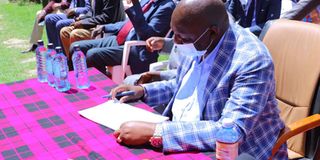Final BBI battleground to be in the courts, election laws suggest

Narok Governor Samuel Tunai with MCAS and members of public signing the BBI rolls at his residence in Narok town on December 1, 2020.
What you need to know:
- Two Bills on the referendum pending in the National Assembly propose that the High Court will be the final arbiter.
Legal fights are shaping up as the last hurdle to Kenya’s reforms push, with twin cases filed at the Supreme Court and the hearing of a third underway at the High Court.
The courts will still have a final say at the tail end of the process in case a petition challenging the outcome of the planned referendum is filed at the High Court.
The law — and the two contentious referendum Bills before Parliament — provides that a three-judge bench appointed by the Chief Justice can nullify the referendum vote if proven its conduct violated the law.
In the latest filing at the Supreme Court on Monday, Makueni Governor Kivutha Kibwana seeks the judges’ advisory on whether a government can seek to amend the Constitution through the popular (peoples’) initiative and spend public resources on the same.
It adds to another pending at the top court by Kericho and Nandi county assemblies seeking directions on the procedure regional parliaments should follow while considering the Constitutional of Kenya (amendment) Bill 2020.
At the High Court, five activists — David Ndii, Jerotich Seii, James Ngondi, Wanjiku Gikonyo and Ikal Angelei — fought off State resistance and convinced the court to send their case against the Building Bridges Initiative-sponsored constitutional changes to the Chief Justice, who will not task three judges to hear them.
Meanwhile, two Bills on the referendum pending in the National Assembly propose that the High Court will be the final arbiter in the event any party is aggrieved by the conduct of the referendum.
The proposed referendum laws borrow heavily from the provisions in the Elections Act of 2011 that guide the referendum, albeit inadequately, hence the push to enact the substantive laws.
“A referendum petition shall be heard and determined by a Bench of three judges appointed by the Chief Justice,” states section 90 of the Elections Act, with the law further providing that the case must be concluded within six months.
“Where the High Court declares a referendum void, the (electoral) Commission shall conduct a fresh referendum,” stipulates section 102 (6) of the Act.
The committees of Justice and Legal Affairs; and the Constitutional Implementation Oversight Committee, propose in their separate Bills the conduct, result and validity of a referendum will be challenged by a petition in the High Court, and that the decision rendered shall be final.
According to the Bills, the High Court may in its decision challenging the outcome of the referendum, dismiss the petition, declare the referendum to be void, or uphold the petition in whole or in part. If it voids the outcome, the IEBC will be required to hold another referendum in 90 days.
The JLAC Bill provides that aggrieved persons can file an appeal in the Court of Appeal against the declaration of the High Court. The appeal should be filed within 30 days of the High Court declaration and heard and determined with six months.
However, in the two Bills, the MPs want a petition on the referendum be determined by a Bench of three judges. Those aggrieved with the conduct of the plebiscite will be required to file the petition within 21 days of the publication of the results.
Only those who vote in a referendum or had a right to vote in a constituency will have the right to file a petition, if the petitions concerns results from that constituency.
A petitioner will be required to deposit Sh1 million as security for costs of a petition within 10 days of presenting the petition, failure to which the petition will be struck out.





